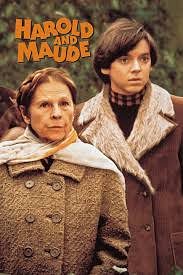
5/5 Stars
Note: This writing contains spoilers.
On a purely plot level, Harold and Maude seems cute: a black comedy about death, an old woman and young man's sexual exploits, and a few shananigans. After my first viewing, that's all I got out of it. It was satisfying; it was smart, funny, a little dry, but nevertheless a film I liked. On a second viewing, I found myself enthralled with one of the emotionally attuned films I’ve seen in my short life.
Harold (Bud Cort) is a death-obsessed boy living with a single mother in a giant mansion. After attending another funeral, he meets Maude (Ruth Gordon), an old woman who at heart never grew up (whether as a way of life or a defense mechanism, I don’t know). After they finally begin talking at another funeral, hijacking a few cars, and Harold seeing Maude naked for the first time, they grow even closer together. As they spend more and more time together and as Harold continually rejects all the women and father figures his mother tries to force on to him, he comes to accept himself; he even finds pleasure in everything around him. As Maude's eightieth birthday comes, she reveals she has taken poison and has committed herself to her final hours. She dies and Harold finally gets rid of the hearse he has been driving and walks off playing the banjo Maude gave him.
The film demonstrates an impressive restraint for how much it actually says. While the narrative seems simple -- a story about learning about accepting death -- all the small details allow for a richer story. The whole thing is made by the small, intimate moments that are sprinkled throughout. Two especially telling moments are when Harrold talks about the first time he got a taste of what if felt like to be dead and he breaks down in front of Maude. There is no judgment or “you shouldn't feel that way"; instead, it's just the understanding and the admittance that a lot of people feel that way, even when still grasping for life. The other is when Harold gives Maude a present and he catches a glimpse of a marking on her arm. It's a mark that was given to her when she survived the Nazi death camps during the second World War. She talks about her love of the old Austrian courts before the empire fell, though she hates countries and borders and wars. Both of these reveal the true depths of the story, which not about normal people learning about death but genuinely hurt people learning to live.

This film isn’t about reveling in sadness and trauma -- it’s a joyous celebration of life. It's about singing and dancing, planting trees and going to theme parks, about eating pie and making love, and doing so much more. The film is sharply funny with a satiric wit to be expected from Colin Higgens (co-writer on 9 to 5), tackling the subjects as far flung from militarism to the prevalence of online dating. The amount of subjects the film tackles may seem like it could weigh it down, yet it manages to keep it in the background. It does not lose focus, maintaining itself as a film about all the stuff concerned for people who live to hate or serve some self-isolating truth. Another aspect that helps with keeping the movie going is Hal Ashby’s direction. As an actor's director, he balances Cort’s mix of wide-eyed innocence and ghastly terror, and Ruth Gordan's youth and maternal instinct. With his direction, Ashby is able to lightly and simply capture the joy and the sensuality of the story.
Let's be clear: this is an erotic film wtih many moments are built on the sexual tension between Harold and Maude. When watching with my dad, his only comment was “Did they bump uglies?” and “Ewww”. This eroticism is essential to the film as the love is the most important; but that erotic nature is essential to keeping the film's momentum going. Every scene with the two protagonists is thoroughly engaging in how there sexual tension is conveyed to an audience both mystified and enthralled.
As one of the well remembered films that came out of New Hollywood, I responded so strongly to something that seemed so closed off at first. Its intention flaunts itself as a film about liberation and joy that can always be infectious. Whenever I think of this I can't help but smile, even when dwelling on Harold's faux-suicide or Maude's final hours.
It is all a part of a big celebration, and it brought me to tears.
As silly as it may seem.



